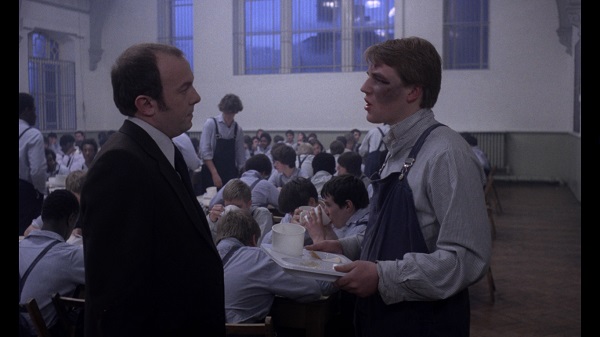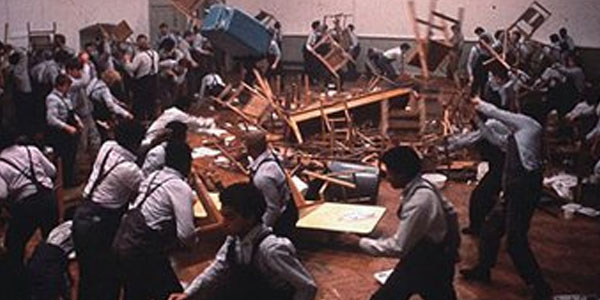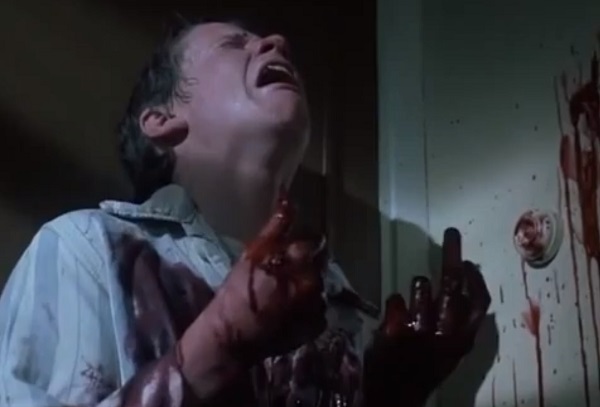Britflix: Scum
Scum was and still is a very controversial movie when it was first made back in 1977, being banned from broadcast by the BBC and re-made by director Alan Clarke, turning it into a cinema release in 1979. This brutal flick is now considered a classic and was Ray Winstone's breakout role.
Carlin (Winstone) is a young man transferred to a tough borstal (a youth prison) after assaulting a guard and is targeted by the wardens and the prison hard-nut/Daddy Banks (John Blundell), making him an example. Despite Carlin wanting to keep his head down, he is forced to take action and seize the role of the Daddy to protect himself and the younger prisoners from Banks and his cronies.

While the story of Carlin's rise in the borstal is perfectly fine, what makes
Scum so special and controversial was showing the wider picture of this horrific world. The depiction of violence, the physical and emotional abuse, the racism and cruelty of the regime is still shocking today, as it shows how broken the system was. There are some horrific sequences as Carlin brutally beats his rivals, a few extremely gruesome suicide attempts and a realistic, hard-to-watch gang rape scene of a teenage boy.
Scum is a movie that requires a strong stomach to view as Clarke shows the full horrors of violence. Blood is spilled and Clarke uses a deliberately minimalistic approach, giving
Scum a more of a voyeuristic look, through its camera work and lack of music throughout the movie to amplify the realism.
The character of Arthur played Mick Ford serves as the critical voice of the borstal system. Arthur rebels using his intelligence and being as awkward possible, stating he is a vegetarian, refusing to wear leather shoes even in the cold winter and riles the Christian governor by looking at Atheism, Sikhism and Islam as alternative beliefs. Arthur sets out to use the rules of the system against it and seen arguing with the prison officials, questioning the treatment of prisoners particularly because of their ages and the idea of prison and whether it did any good at reforming people. A compelling scene is when Arthur is debating the rights and wrongs of incarceration with a senior prison guard as he avoids going to chapel and questions well why he takes such as a antagonistic approach with the authorities.

Clarke has a reputation for hard-hitting, gritty stories with realistic violence and a political edge.
Scum is the best example of this, as he vents his anger at a horrible system that fortunately no longer exists. As well as the exploration of racism, violence and bullying,
Scum also looks at the dehumanization effects on young people in this prison institution and small issues like some of the characters being unable to read, which could interpreted as either as an indictment of the wider education, that the characters may have a undiagnosed learning disability like dyslexia or simply criticizing the education in the borstals as they are in a regime of hard-labor.
Carlin is still of Winstone's most iconic roles, even after his long career. It is one of his best performed roles, cementing early on his hard-man image. Carlin himself is an interesting character because he is someone who uses his new found power to protect the weaker prisoners and advice them when he can, but he is still not above using racist language when taking on one of his rivals.
 Scum
Scum has a strong cast of young actors for its time, with Ford and Julian Firth being particular highlights in their roles, playing two very different characters. Firth is especially memorial because of his emotional performance. Actors like Phil Daniels and Patrick Murray appear in smaller roles and both ended up having successful careers on British Television, appearing in
Eastenders and
Only Fouls and Horses respectively.
Scum is a raw, powerful drama that still has the ability to shock after 35 years since its release. It is a movie deserving of its cult status and is one of Clarke's and Winstone's best pictures.
 While the story of Carlin's rise in the borstal is perfectly fine, what makes Scum so special and controversial was showing the wider picture of this horrific world. The depiction of violence, the physical and emotional abuse, the racism and cruelty of the regime is still shocking today, as it shows how broken the system was. There are some horrific sequences as Carlin brutally beats his rivals, a few extremely gruesome suicide attempts and a realistic, hard-to-watch gang rape scene of a teenage boy. Scum is a movie that requires a strong stomach to view as Clarke shows the full horrors of violence. Blood is spilled and Clarke uses a deliberately minimalistic approach, giving Scum a more of a voyeuristic look, through its camera work and lack of music throughout the movie to amplify the realism.
The character of Arthur played Mick Ford serves as the critical voice of the borstal system. Arthur rebels using his intelligence and being as awkward possible, stating he is a vegetarian, refusing to wear leather shoes even in the cold winter and riles the Christian governor by looking at Atheism, Sikhism and Islam as alternative beliefs. Arthur sets out to use the rules of the system against it and seen arguing with the prison officials, questioning the treatment of prisoners particularly because of their ages and the idea of prison and whether it did any good at reforming people. A compelling scene is when Arthur is debating the rights and wrongs of incarceration with a senior prison guard as he avoids going to chapel and questions well why he takes such as a antagonistic approach with the authorities.
While the story of Carlin's rise in the borstal is perfectly fine, what makes Scum so special and controversial was showing the wider picture of this horrific world. The depiction of violence, the physical and emotional abuse, the racism and cruelty of the regime is still shocking today, as it shows how broken the system was. There are some horrific sequences as Carlin brutally beats his rivals, a few extremely gruesome suicide attempts and a realistic, hard-to-watch gang rape scene of a teenage boy. Scum is a movie that requires a strong stomach to view as Clarke shows the full horrors of violence. Blood is spilled and Clarke uses a deliberately minimalistic approach, giving Scum a more of a voyeuristic look, through its camera work and lack of music throughout the movie to amplify the realism.
The character of Arthur played Mick Ford serves as the critical voice of the borstal system. Arthur rebels using his intelligence and being as awkward possible, stating he is a vegetarian, refusing to wear leather shoes even in the cold winter and riles the Christian governor by looking at Atheism, Sikhism and Islam as alternative beliefs. Arthur sets out to use the rules of the system against it and seen arguing with the prison officials, questioning the treatment of prisoners particularly because of their ages and the idea of prison and whether it did any good at reforming people. A compelling scene is when Arthur is debating the rights and wrongs of incarceration with a senior prison guard as he avoids going to chapel and questions well why he takes such as a antagonistic approach with the authorities.
 Clarke has a reputation for hard-hitting, gritty stories with realistic violence and a political edge. Scum is the best example of this, as he vents his anger at a horrible system that fortunately no longer exists. As well as the exploration of racism, violence and bullying, Scum also looks at the dehumanization effects on young people in this prison institution and small issues like some of the characters being unable to read, which could interpreted as either as an indictment of the wider education, that the characters may have a undiagnosed learning disability like dyslexia or simply criticizing the education in the borstals as they are in a regime of hard-labor.
Carlin is still of Winstone's most iconic roles, even after his long career. It is one of his best performed roles, cementing early on his hard-man image. Carlin himself is an interesting character because he is someone who uses his new found power to protect the weaker prisoners and advice them when he can, but he is still not above using racist language when taking on one of his rivals.
Clarke has a reputation for hard-hitting, gritty stories with realistic violence and a political edge. Scum is the best example of this, as he vents his anger at a horrible system that fortunately no longer exists. As well as the exploration of racism, violence and bullying, Scum also looks at the dehumanization effects on young people in this prison institution and small issues like some of the characters being unable to read, which could interpreted as either as an indictment of the wider education, that the characters may have a undiagnosed learning disability like dyslexia or simply criticizing the education in the borstals as they are in a regime of hard-labor.
Carlin is still of Winstone's most iconic roles, even after his long career. It is one of his best performed roles, cementing early on his hard-man image. Carlin himself is an interesting character because he is someone who uses his new found power to protect the weaker prisoners and advice them when he can, but he is still not above using racist language when taking on one of his rivals.
 Scum has a strong cast of young actors for its time, with Ford and Julian Firth being particular highlights in their roles, playing two very different characters. Firth is especially memorial because of his emotional performance. Actors like Phil Daniels and Patrick Murray appear in smaller roles and both ended up having successful careers on British Television, appearing in Eastenders and Only Fouls and Horses respectively.
Scum is a raw, powerful drama that still has the ability to shock after 35 years since its release. It is a movie deserving of its cult status and is one of Clarke's and Winstone's best pictures.
Scum has a strong cast of young actors for its time, with Ford and Julian Firth being particular highlights in their roles, playing two very different characters. Firth is especially memorial because of his emotional performance. Actors like Phil Daniels and Patrick Murray appear in smaller roles and both ended up having successful careers on British Television, appearing in Eastenders and Only Fouls and Horses respectively.
Scum is a raw, powerful drama that still has the ability to shock after 35 years since its release. It is a movie deserving of its cult status and is one of Clarke's and Winstone's best pictures.